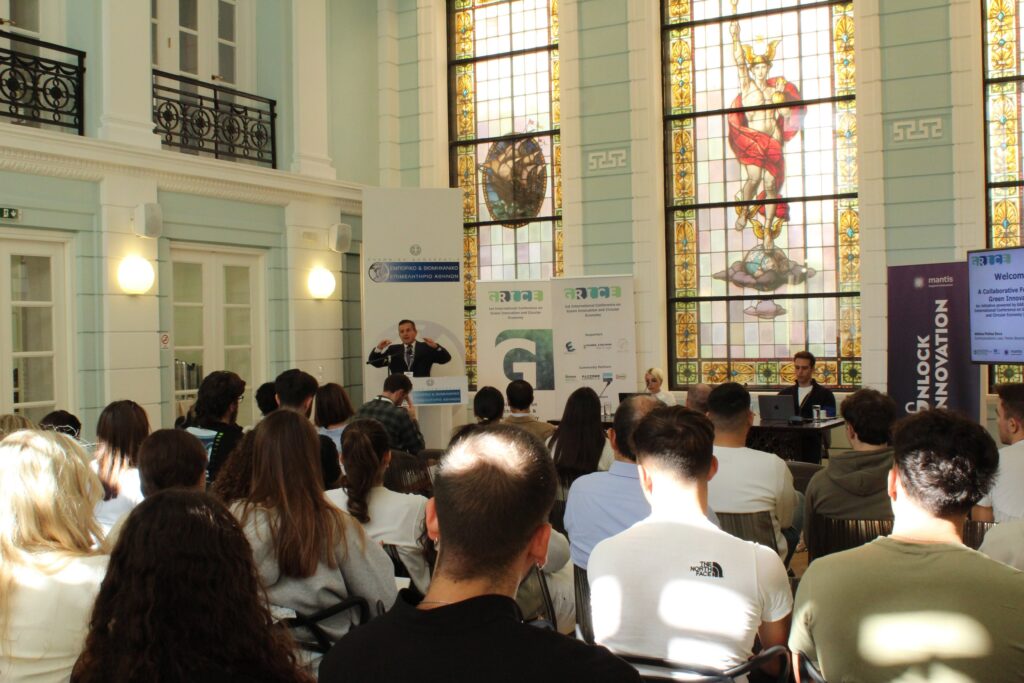GR-I-CE 2024: Green Innovation and Circular Economy towards a Sustainable Future

The 1st International Conference on Green Innovation and Circular Economy (GR-I-CE 2024) took place in Athens from October 20 to 23, successfully bringing together 170 participants from various sectors, including research centers, businesses, public institutions, universities, SMEs, NGOs, and startups, alongside decision-makers. A total of 48 research papers were presented, and 11 discussion panels featured 52 representatives from green innovation and circular economy sectors.
The opening ceremony was held on October 20 in the Averoff Hall, a historic building of the National Technical University of Athens (NTUA). Professor Konstantinos Aravossis, Chair of the GR-I-CE 2024 Organizing Committee, UNESCO Chairholder on Green Innovation and Circular Economy at NTUA, and Vice President of the Regulatory Authority for Waste, Energy, and Water (RAAEY), welcomed participants and introduced the conference goals. NTUA Rector Professor Ioannis Hatzigeorgiou emphasized the university’s leading role in sustainability, while the Ambassador of the Permanent Delegate of Greece to UNESCO Georgios Koumoutsakos highlighted the importance of international partnerships for achieving sustainability goals.
Keynotes from distinguished academics, such as Professor Christos Zerefos and Professor Costas Synolakis, underscored the severity of the climate crisis and the urgent need for global collaboration and action. Professor Zerefos presented scientific data on climate change scenarios, while Professor Synolakis highlighted green innovation as a pathway to climate resilience through innovations that can benefit both businesses and everyday life.
The conference was structured around four pillars:
- Academic Pillar: High-quality research papers were presented, focusing on the latest developments in circular economy and green innovation, laying the groundwork for future innovations.
- Business Pillar: Industry experts shared insights into sustainability, green investments, and environmental management, fostering a fruitful exchange of best practices in circular economy.
- Green Innovation Pillar: Under the Ecoinnovation initiative, green startups showcased sustainable solutions, pushing the boundaries of sustainable development and featuring initiatives integrating circular economy principles.
- Cultural Pillar: The connection between sustainability and culture was highlighted, underscoring the inextricable link between sustainability and societal and cultural life.
During discussions, public institutions, universities, media, NGOs, and businesses examined the challenges and opportunities in the green transition. The conference also hosted roundtable events organized by key institutions such as Regulatory Authority for Waste, Energy, and Water (RAAEY), the Hellenic Solid Waste Management Association, The Greek Association of Environmental Protection Companies (PASEPPE), and held special sessions by InCommon, SOFFA, and the Chatzigakis Foundation.
Additionally, the GAEA Challenge, a European green innovation program, was presented, promoting eco-entrepreneurship with funding opportunities for startups.
The final day of the conference offered cultural and networking opportunities, including tours of the Acropolis and Sounion, allowing participants to enjoy Greece’s heritage and natural beauty.
The GR-I-CE 2024 Conference was organized by the UNESCO Chair on Green Innovation and Circular Economy of NTUA in collaboration with Mantis Beyond Innovation, with support from the Ministry of Environment and Energy and RAAEY.
GR-I-CE 2024 represented a milestone for promoting green innovation and circular economy, providing a platform to shape the future of sustainability globally.
You can watch the conference recap video, while the agenda and book of abstracts are available too.
For more information about the next conference, GR-I-CE, please visit: https://griceconf.eu
